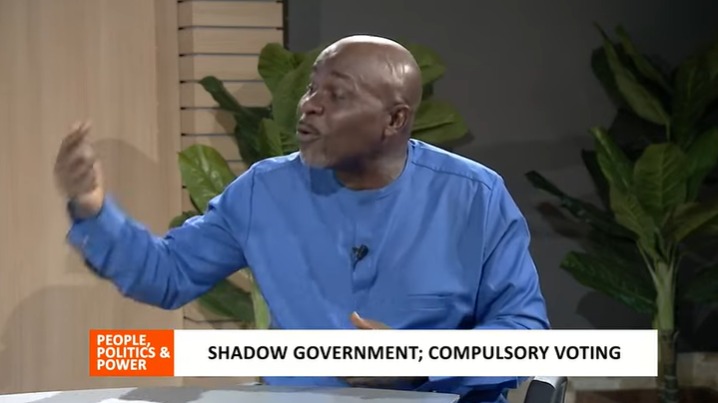The most recent Politics, People & Power issue featured a very enlightening debate between Nigeria’s most politically charged issues: the so-called compulsory voting bill and the so-called “shadow government” controversy.
The spotlight fell on Professor Jideofor Adibe, political science lecturer at Nasarawa State University, Keffi, whose thoughtful analysis brought gravitas and substance to such knotty issues.
Compulsory Voting: Treating Symptoms, Not Causes
An on-deck bill in Nigeria’s National Assembly seeks to compel all registered voters nationwide to vote or be punished. The bill’s proponents believe it would render voting turnout impenetrable and strengthen democracy. However, Professor Adibe warned that compulsory voting is not at the forefront until then.
“Voting can never be forced within an election when the people lose faith in the system,” he explained. Nigeria’s elections have been marred by corruption, bribery, and rigging for decades, and most of its citizens have boycotted as a protest or outrage.
“You don’t put the cart before the horse,” Professor Adibe had reminded once more. “We first need to establish electoral integrity and public trust. Then participation will get better voluntarily.”
He cautioned that compelled voting under such circumstances may attract hostility and legal challenges instead. Alternately, attempts must be made to reform electoral institutions, make them transparent, and educate voters in order to restore public trust in the system.
The Shadow Government: Opposition Weakness Reflected
There has also been uproar over a “shadow government,” which has also been sending shivers down the spine regarding political stability. Others perceive it as a threat to the APC ruling party and the stability of democratic governance in Nigeria.
Professor Adibe explained that internal party fragmentation and brawling among opposition parties, such as the Peoples Democratic Party (PDP) and Labour Party, significantly contribute to the perception. Disintegration at leadership levels and frequent party hopping have rendered the opposition unable to emerge as a credible counterforce to the ruling class.
He described a significant difference being lost in the majority of populist discourse:
“Nigeria is not a one-party system where there is only one party that is sanctioned by law. We are a one-party dominant state where the APC dominates the politics but with other parties of opposition who are present and fight to the grave.”
He called on Nigerians to blame poor opposition parties instead of the government.
Democracy’s Growing Pains: Patience and Engagement Are Key
Professor Adibe also received Nigeria’s democratization, and with caution, warning that no democracy will ever be perfect, even mature democracies like America cannot escape participation and political polarization.
He advocated freedom of exchange and cautioned against “prior restraint,” where efforts at closing down or proscribing political discussion can stifle democratic development.
The television programme’s rhetorical arguments rode the waves of Nigerian political tensions. Arguments about mandatory voting and ghost government punishment echo natural fears of participation and accountability.
Why Professor Adibe’s Position Matters
Professor Adibe’s learned, moderate thesis brings much-needed clarity to Nigerian politics. His proposal that religion should first be re-ignited before voting is made compulsory aligns international standards of democracy with what is proper and contends that even law cannot heal political apathy.
His management of opposition dynamics dispels the myth that the collapse of their relations is still the sole reason for state repression and that the parties need to reform themselves and improve their ability to hold office accountable.
Conclusion: Deepening Nigeria’s Democracy
Nigeria’s democracy is still in its teenage stage, led by such conflicts. Professor Adibe is teaching us that trust, transparency, and citizen involvement foster democracy, not the law.
Until it can deal with the root of electoral apathy: political inclusivity and election legitimacy, Nigeria is never poised to force citizens to vote, likewise, as much as the shadow government dimension entails reading the woes of the opposition party.
As Nigeria’s fate knocks at the door, voices like that of Professor Jideofor Adibe are good directions towards a more inclusive, dynamic democracy.




